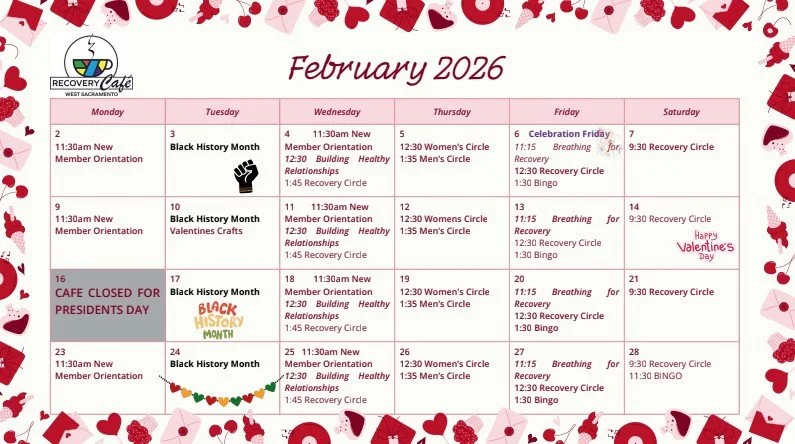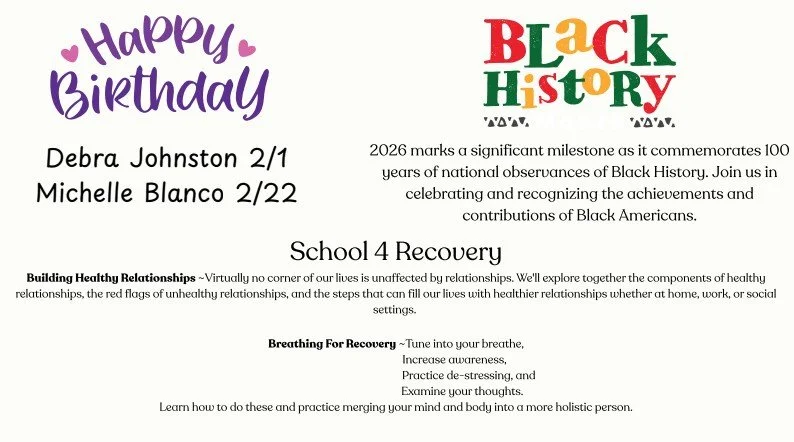RECOVERY CAFE WEST SAC
Restorative, adj: the power to give back something previously stolen, taken away, or lost.
“I’m recovering from 20 years of drug abuse.”
“I’m recovering from childhood trauma.”
“I’m recovering from homelessness and addiction.”
“I’m recovering from mental-health struggles.”
“I’m recovering from traumatic loss.”
They roll in through the doors every day: young and old, every race, every gender, every story. They know trauma - whether substance-use disorders, homelessness, mental-health struggles, domestic violence, or PTSD. They also know what restorative community looks like. THEY ARE IT.
In adjoining rooms, members take part in weekly recovery support groups, or in specialized art, exercise and life-skills classes as part of a School for Recovery. Everything is free. Everywhere you look speaks welcome, worth, and warmth.
Welcome to the Recovery Cafe West Sac, a stirring corner of restorative community unveiled by the Mercy Coalition in 2022. It’s a safe, healing space, launched in partnership with the nationwide Recovery Cafe Network, currently comprised of 60 sites around the country. The Recovery Cafe concept centers around a free midday meal in a community space that is drug-and-alcohol-free, and which employs a peer-driven model of accountability, belonging and growth.
“As a long-term mental-health strategy, it could be a game-changer for so many,” said Don Bosley, Mercy’s executive director. “The minute we saw the Recovery Cafe model, we knew it was the perfect box in which to package all the restorative community programming that we’ve wanted to do - and a whole lot more.”
“It’s an evidence-based approach,” said West Sacramento Mayor Martha Guerrero, who along with Mercy staff and board members toured the Recovery Cafe site in San Jose on March 2022. “This model was chosen because it effectively and compassionately earns the trust of unsheltered individuals who are additionally challenged by vulnerabilities such as chronic illness, trauma and substance-use disorders.”
RECOVERY CAFE WEST SAC FACT SHEET
WHAT IS IS
Recovery Cafe West Sac is a restorative community supporting individuals who have suffered trauma, homelessness, addiction and other mental-health challenges. It centers around a community space that is drug- and alcohol-free, embracing, and healing, and which employs a peer-driven model of accountability, belonging and growth.
SITE: Community Lutheran Church, 920 Drever Street, West Sacramento. **Although grateful for the ongoing support and partnership of
Community Lutheran Church, the Mercy Coalition of West Sacramento and the Recovery Cafe programming have no religious affiliation.
HOURS OF OPERATION: Weekdays from 11:30am-3pm (Lunch served from 12 to 1:30pm)
PARTNER | MODEL: Mercy Coalition is a member of the nationally-recognized Recovery Cafe Network, currently comprised of 60 sites around the country. All RCN sites subscribe to a baseline person-oriented model that includes the following core components:
The creation of community space that is drug- and alcohol-free, embracing, and healing.
Nurturing structures of loving accountability called Recovery Circles
The empowering of every Member to be a contributor.
The raising up of Member leaders
Ensuring responsible stewardship
Working to end systemic racism and socioeconomic inequality so every person can thrive
MEMBERSHIP
Per the RCN model, membership is free, and open to all. The requirements to maintain one’s membership are:
Be drug- and alcohol-free for 24 hours before entering the cafe.
Attend your Recovery Circle each week
Give back by participating in cafe chores (cleaning, serving meals, etc.)
FOOD & BEVERAGE
All of the cafe’s food and beverage offerings will be free to members, including coffee available throughout the day. Cafe staff will provide a hot meal at lunchtime for all, and Members can enjoy the flavored latte of their choice during Latte Hour in the afternoon.
PROGRAMMING
Recovery Circles: The only compulsory programming at the cafe, our weekly Recovery Circles are Member small groups that gather with a trained facilitator for the purpose of supporting one another’s recovery journey. Recovery Circles act as points of accountability, encouragement and shared resilience.
School of Recovery: This RCN model features non-compulsory courses 6 to 8 weeks in length, each focused on a particular aspect of recovery/addiction, inner healing and healthy living. Mercy Coalition’s early menu of topics includes Building a Strong Recovery Foundation; Healing Grief; Healthy Relationships; Mindfulness; Writing for Recovery; and more.
JAM Academy: Mercy Coalition’s existing workforce development program, the Job And Mentoring (JAM) Academy, finds a natural fit in the Recovery Cafe, with a number of cafe positions filled by JAM trainees who are themselves members of our priority population. Levels 1 and 2 of the JAM Academy focus on basic employment skills and vocational goals, while Level 3 includes opportunities for peer mentoring.






